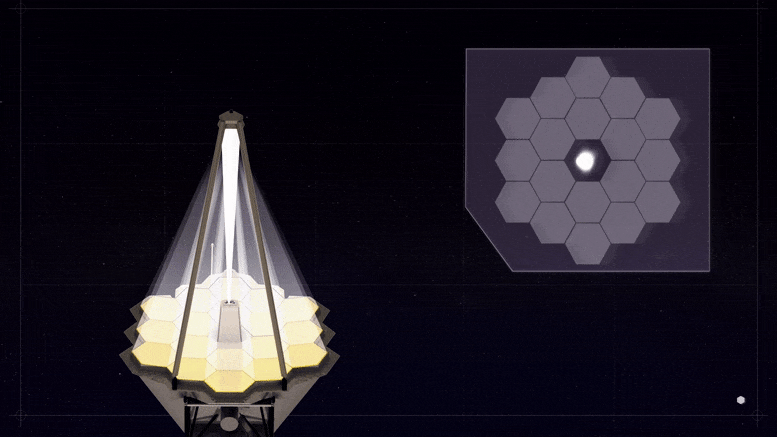
Bildnachweis: Goddard Space Flight Center der NASA
Nach dem Beginn der Spiegelausrichtung mit der ersten Erkennung von Sternenlicht durch das Internet in der Nahinfrarotkamera (NIRCam) arbeitet das Teleskopteam hart an den nächsten Schritten, um das Teleskop mit Strom zu versorgen. Um weitere Fortschritte zu erzielen, muss das Team ein anderes Instrument, den Präzisionsführungssensor, verwenden, um es auf einem Leitstern zu montieren und das Teleskop nach oben gerichtet zu halten.[{“ attribute=““>accuracy. We have asked René Doyon and Nathalie Ouellette of the Université de Montréal to explain how Webb uses its Canadian instrument in this process.
“After being powered on January 28, 2022, and undergoing successful aliveness and functional tests, Webb’s Fine Guidance Sensor (FGS) has now successfully performed its very first guiding operation! Together with the Near-Infrared Imager and Slitless Spectrograph (NIRISS), the FGS is one of Canada’s contributions to the mission.
“To ensure Webb stays locked on its celestial targets, the FGS measures the exact position of a guide star in its field of view 16 times per second and sends adjustments to the telescope’s fine steering mirror about three times per second. In addition to its speed, the FGS also needs to be incredibly precise. The degree of precision with which it can detect changes in the pointing to a celestial object is the equivalent of a person in New York City being able to see the eye motion of someone blinking at the Canadian border 500 kilometers (311 miles) away!
“Webb’s 18 primary mirror segments are not yet aligned, so each star appears as 18 duplicate images. On February 13, FGS successfully locked onto and tracked one of these star images for the first time. The FGS team was thrilled to see this ‘closed loop guiding’ working! From now on, most of the alignment process of the telescope mirrors will take place with FGS guiding, while NIRCam images provide the diagnostic information for mirror adjustments.”
– René Doyon, principal investigator for FGS/NIRISS, Université de Montréal; and Nathalie Ouellette, Webb outreach scientist, Université de Montréal
geschrieben von:
- Jonathan Gardner, stellvertretender leitender Wissenschaftler des Webprojekts, NASAGoddard Space Flight Center
- und Alexandra Lockwood, Webb Science Communications Project Scientist, Space Telescope Science Institute

„Musikfan. Sehr bescheidener Entdecker. Analytiker. Reisefreak. Extremer Fernsehlehrer. Gamer.“







More Stories
Neue Forschungen zu einer massiven Überschiebung deuten darauf hin, dass das nächste große Erdbeben unmittelbar bevorstehen könnte
Tag und Nacht sprühen Funken, während SpaceX den Start einer Starship-Rakete vorbereitet
Identische Dinosaurier-Fußabdrücke auf zwei Kontinenten entdeckt